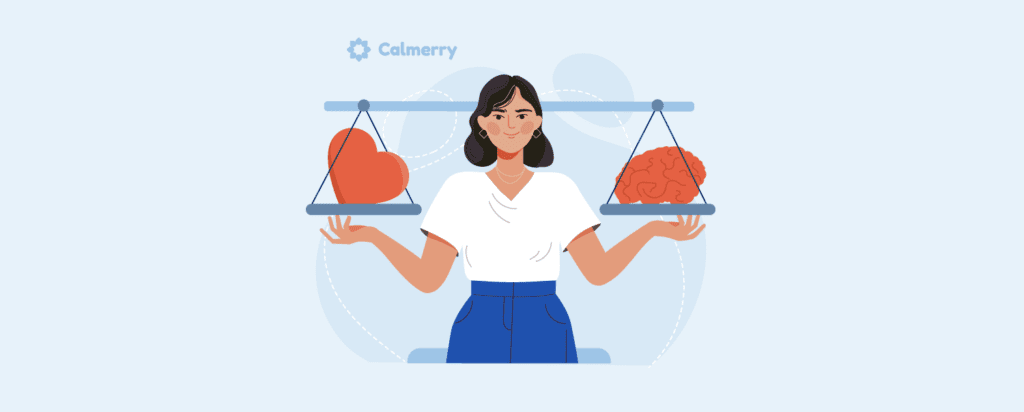10 Steps to Develop a Growth Mindset + QUIZ

In this article
Have you ever noticed that some of your inner beliefs encouraged you to make “logical” decisions, but they didn’t resonate in your heart and led to total dissatisfaction with your life?
Or maybe, you can recall the moments when you bravely faced challenges, put effort into improving, and eventually thrived.
It’s interesting how our inner beliefs can guide our lives.
Carol Dweck, Professor of Psychology at Stanford University, has done extensive research on human motivation and self-conceptions, especially in the area of education. In her works, she discusses how our beliefs about learning and dealing with difficulties can affect our ability to succeed and introduces the concept of mindsets – a growth mindset and a fixed one.
A growth mindset is a term you may have heard thrown around in self-improvement circles. But what is it? Is it a secret ingredient to success that promotes better well-being and higher life satisfaction? And how can you develop one for yourself?
What is a growth mindset?
A growth mindset is a belief that intelligence, talents, traits, and abilities can be developed over time through hard work, determination, persistence, and reflection on constructive feedback. It’s about recognizing that these attributes are malleable and always evolving.
Ultimately, this belief leads to a love of learning and a willingness to take on challenges. Just take a closer look at these statements to recognize the growth mindset examples. Which of them resonates with you most?
- “I’m 30 – too late to learn piano…”
“I’ll give it a go anytime I want.” - “With my poor social skills, I’ll never meet someone nice.”
“My manager said I should improve my public speaking skills. I’ll enroll in a course!” - “I was always terrible at painting, so why try?”
“Okay, for now, it’s far from a masterpiece. But with practice, it’ll improve.”
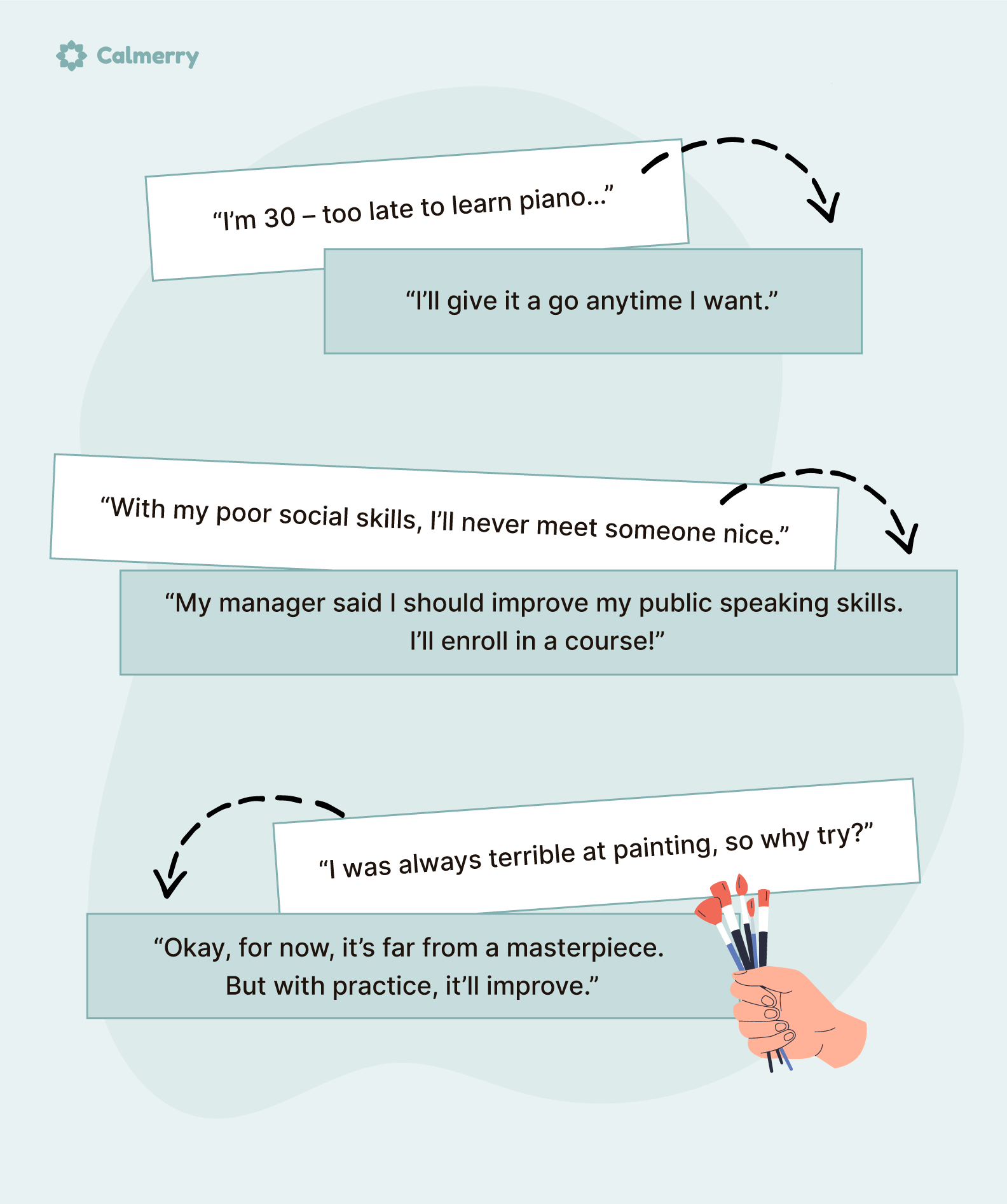
Some of these cases illustrate that, according to this concept, your mind is like a muscle: the more you use it, the stronger it gets. Neuroscience supports this idea by relying on concepts like neuroplasticity – “…the capacity for our brain cells to change in response to our behavior.”
So people with a growth mindset embrace challenges and see failure as a step on the road to success – not as an indicator that they are unworthy or incompetent. Along the way, they often discover hidden talents and abilities that they never knew they had.
As Thomas Edison wisely said, “Failing is one of the greatest arts in the world. One fails forward towards success.”
Why is a growth mindset important?
As studies by MindsetMaker™ prove, a growth mindset plays a key role in maintaining many aspects of our lives at their best: education, workplace, relationships, creativity, self-concept, and mental well-being.
Yes, a growth mindset is an essential part of maintaining good mental health.
For example, many people delay seeking treatment because they believe their depression is caused by a chemical imbalance in the brain, so there’s nothing they can do to overcome it.
Similarly, a great number of clients give up on the treatment process when they don’t feel any improvements or as soon as sessions become tough. But here’s the somewhat harsh truth: the healing process requires your involvement, dedication, and effort, too. And that’s the approach of the growth mindset.
The good news: there are a whole lot of things you can do and skills you can learn to improve your mental well-being. And a growth mindset helps to find that inner power to keep moving on your path to healing and becoming the best version of yourself.
There are some other research-backed benefits of a growth mindset:
- It has been linked with increased motivation, job satisfaction, and overall success
- It’s associated with lower stress levels
- It’s a predictor of healthy self-esteem
- It helps to see your overwhelming emotions as a part of healing instead of considering them as something negative or dangerous and avoiding them
- It provides resilience in the face of setbacks because you’ll know that they’re not permanent.
- It can help you persevere through challenging situations and achieve your goals using more mastery-oriented learning strategies
- Finally, having a growth mindset drives you to improve your relationships.
What is a fixed mindset?
People with a fixed mindset think of their abilities and traits as set in stone. They don’t think they can improve them, no matter how hard they try. As a result, they are often afraid to take risks or put forth effort for fear of failing and looking foolish.
Such people also tend to give up easily and are reluctant to take on new challenges because of seeing failure as a sign that they just don’t have what it takes. Any criticism serves as proof that they’re unworthy and inadequate.
And as Dr. Dweck explained, “…their belief in fixed traits – is telling them something entirely different: that success is about being more gifted than others, that failure does measure you, and that effort is for those who can’t make it on talent.”
These “fixed mindset” examples below may give more insights into it. Check whether they resonate with you:
- “You’re either born talented, or you won’t succeed.”
- “I’m just bad at math, see no point in trying to solve that equation.”
- “They already succeeded in their business in their 20’s. I see no point in starting mine now.”
- “I don’t want to look stupid, so I better not raise my hand to ask.”
- “I’ll never get better and never heal from trauma – I just have to accept that.”
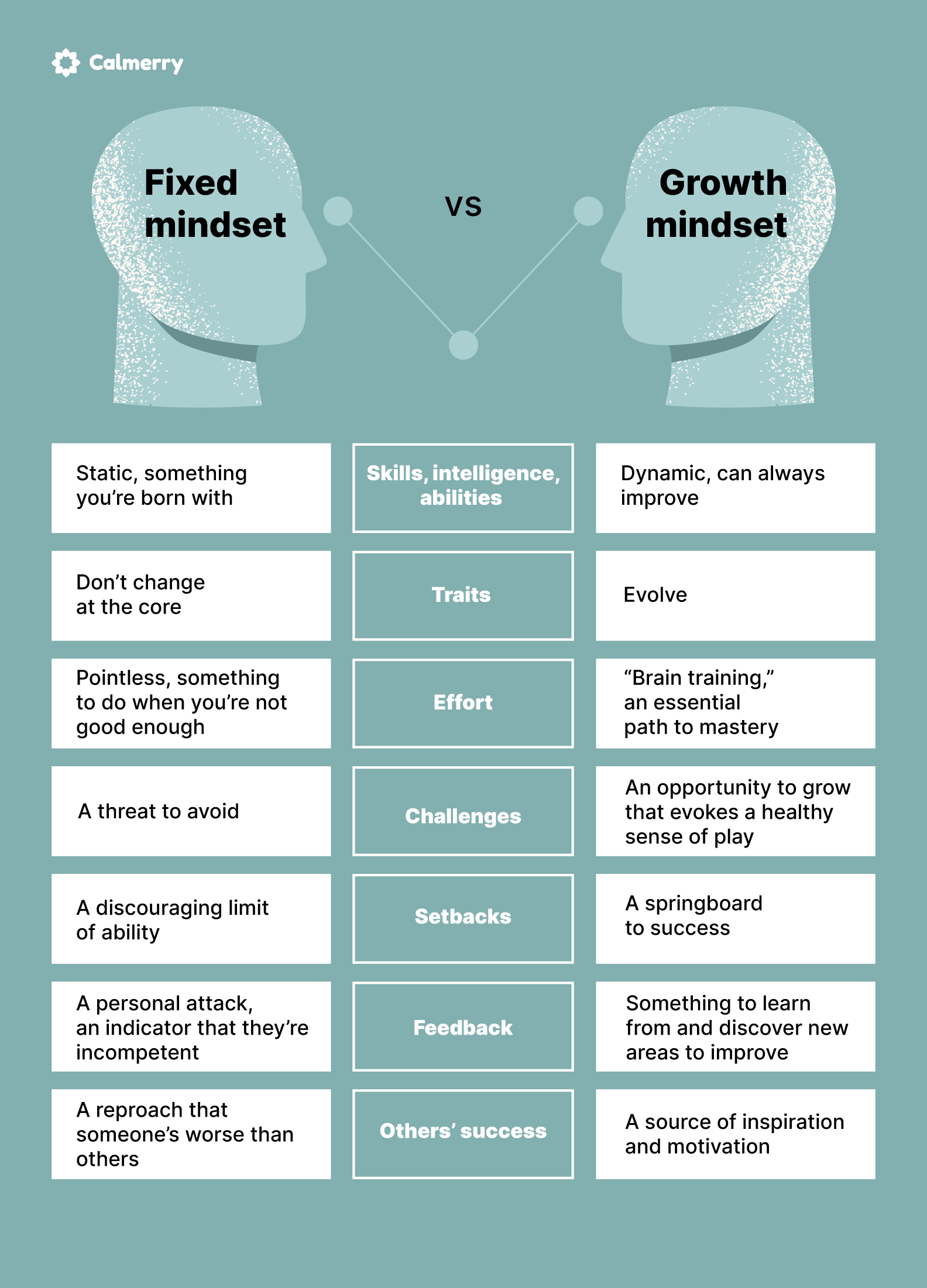
Is a fixed mindset bad for your mental health?
It’s no secret that having a fixed mindset can hold you back in life. So how does it influence mental health? Studies suggest that this link is a two-way street – they can impact each other over time.
For example, a fixed mindset is associated with:
- Feeling stuck
- Rumination
- Decreased motivation
- More severe symptoms of anxiety and depression
- Self-sabotaging behaviors
- Believing you can’t influence your well-being and heal
- Low self-esteem
- Decreased self-awareness
- Feelings of inadequacy
- Inability to build fulfilling relationships
The good news is that if you have a fixed mindset, you can always choose to adopt a growth mindset. As we mentioned, it’s vital for maintaining good mental health.
However, this approach isn’t a magic wand that will make mental health problems disappear. There are also some other misconceptions about the mindset concept:
- You can have either a growth or a fixed mindset
- A growth mindset is only about being positive
- It’s about pushing yourself to be perfect
- It’s about ignoring social and environmental barriers that create inequality and inequity or hold people back
- With a growth mindset, everything is possible
- It guarantees success
- It’ll definitely change your life 180°
- If you have a fixed mindset, you’re doomed to failure
Rather, it’s a powerful tool that gives you better coping mechanisms, motivates you to start working towards solutions, and opens new ways for positive changes in your life.
If you’re struggling with mental health issues, talking to a therapist is a great way to get the professional care you need. A therapist can provide support and guidance as you work through your challenges.
Mindset quiz – find out your type
Take the Mindset Quiz below to test your mindset type. There are no right or wrong answers.
Note: This quiz is inspired by the Dweck Mindset Instrument (DMI). It can be used for educational purposes only. Only a licensed mental health professional can provide an accurate personality assessment.
1) My intelligence is something basic that I can’t change very much.
Do you agree with this statement?
A. Strongly agree
B. Agree
C. Disagree
D. Strongly disagree
2) No matter who I am and how much intelligence I have, I can always change it quite a bit.
Do you agree with this statement?
A. Strongly agree
B. Agree
C. Disagree
D. Strongly disagree
3) I can always substantially improve my intelligence.
Do you agree with this statement?
A. Strongly agree
B. Agree
C. Disagree
D. Strongly disagree
4) I am what I am, and there’s not much that I can do to really change that.
Do you agree with this statement?
A. Strongly agree
B. Agree
C. Disagree
D. Strongly disagree
5) I can always change basic things about the kind of person I am.
Do you agree with this statement?
A. Strongly agree
B. Agree
C. Disagree
D. Strongly disagree
6) Everyone can learn musical ability.
Do you agree with this statement?
A. Strongly agree
B. Agree
C. Disagree
D. Strongly disagree
7) Only people who are “born with it” can be truly good at sports.
Do you agree with this statement?
A. Strongly agree
B. Agree
C. Disagree
D. Strongly disagree
8) Math is much easier to learn if you’re a male.
Do you agree with this statement?
A. Strongly agree
B. Agree
C. Disagree
D. Strongly disagree
9) The harder I work at something, the better I’ll be at it.
Do you agree with this statement?
A. Strongly agree
B. Agree
C. Disagree
D. Strongly disagree
10) No matter what kind of person I am, I can always transform myself substantially.
Do you agree with this statement?
A. Strongly agree
B. Agree
C. Disagree
D. Strongly disagree
11) Trying new things is stressful for me.
Do you agree with this statement?
A. Strongly agree
B. Agree
C. Disagree
D. Strongly disagree
12) It’s not often that people change at their core.
Do you agree with this statement?
A. Strongly agree
B. Agree
C. Disagree
D. Strongly disagree
13) I appreciate feedback about my performance from the people I respect/admire.
Do you agree with this statement?
A. Strongly agree
B. Agree
C. Disagree
D. Strongly disagree
14) I often get angry when I get feedback about my performance.
Do you agree with this statement?
A. Strongly agree
B. Agree
C. Disagree
D. Strongly disagree
15) People, when given equal resources, possibilities, and opportunities, are all capable of the same amount of learning.
Do you agree with this statement?
A. Strongly agree
B. Agree
C. Disagree
D. Strongly disagree
16) I can learn new things, but I can’t really change how intelligent I am.
Do you agree with this statement?
A. Strongly agree
B. Agree
C. Disagree
D. Strongly disagree
17) I can do things differently, but the core parts of who I am – my skills, character, personality – сan’t really be changed.
Do you agree with this statement?
A. Strongly agree
B. Agree
C. Disagree
D. Strongly disagree
18) All people can make mistakes, and that’s okay.
Do you agree with this statement?
A. Strongly agree
B. Agree
C. Disagree
D. Strongly disagree
19) I like learning new things.
Do you agree with this statement?
A. Strongly agree
B. Agree
C. Disagree
D. Strongly disagree
20) Truly smart people don’t need to try hard.
Do you agree with this statement?
A. Strongly agree
B. Agree
C. Disagree
D. Strongly disagree
Skill for the win: How to develop a growth mindset
By adopting a growth mindset, you can improve your chances of achieving your goals, reaching your full potential, and start living a fulfilling life. Yet, nobody says that it’s easy to develop it.
So where to start? We’ve rounded up 10 strategies worth trying:
1. Be prepared to keep practicing even through frustration
A growth mindset is all about practice. But it may not always be effective, and that’s okay.
Imagine that you’ve been working hard on your therapy goals and making progress, but suddenly you hit a wall. No matter what you do, you just can’t seem to get any better. This can be extremely frustrating, and it’s tempting to give up altogether.
But the idea of the growth mindset concept is that it’s important to persevere even when you don’t feel any obvious results.
Practicing regularly is essential for skill development. But it’s actually quite normal to have some days where you feel like you’re not making any progress at all. The key is to focus on the objectives and keep going even when it feels like you’re not getting anywhere.
The only way to overcome the plateau effect is to keep working at it. So don’t give up – keep practicing, and eventually, you’ll start seeing the results you want.
2. Don’t compare your chapter 2 with someone’s chapter 20
It’s easy to compare ourselves to others and think that we’re not doing as well as they are. We see them succeeding and think that we must be failing in comparison. But the truth is that everyone’s journey is different.
Just because someone is further along than you are doesn’t mean that you’re not doing well. You’re on your own unique path.
As Carol Dweck puts it, “Success is about being your best self, not about being better than others.”
So remember to celebrate your own accomplishments along the way – big and small – and keep moving forward. You’ll get to your chapter 20 and beyond in due time. And it will be all the sweeter for having taken your own unique journey to get there.
3. Challenge your “fixed-mindset” self-talk
Anyone who’s ever tried to change an unproductive habit or adopt a new one knows that it’s not easy. Whether you’re trying to eat healthier, exercise more, learn a new language, or create more space for “me-time,” the process of change can be frustrating and sometimes unsuccessful.
Why is it so hard to stick to our good intentions? A lot of it has to do with the way we talk to ourselves.
If you find yourself repeatedly falling short of your goals, it may be time to challenge your “fixed-mindset” self-talk. This is the kind of negative inner dialogue that tells you things like, “I can’t do this,” “I’m not good enough,” or “I don’t deserve success.”
It’s based on the belief that our abilities are static – you either have them or you don’t. But the truth is that everyone has the potential to grow and make positive changes.
So next time you find yourself doubting your ability to reach a goal, try reframing your self-talk in a more positive light.
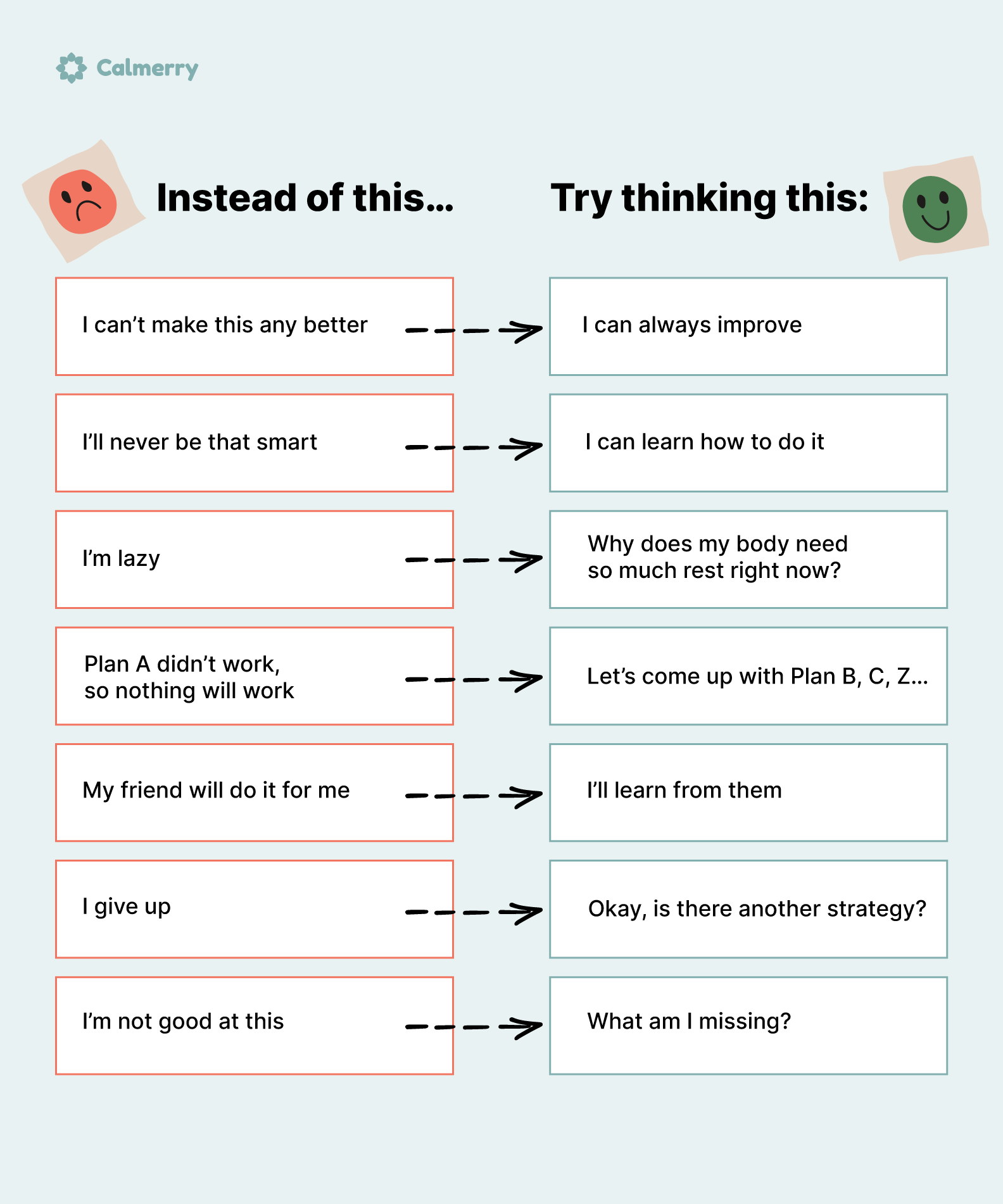
4. Mind the language you use – it matters
This strategy’s directly connected with the previous one. But it’s important to keep in mind that small words matter.
For instance, Carol Dweck describes that we can build a growth mindset with changes as simple as adding the word “yet” to key sentences. It just might make all the difference.
She makes the distinction between saying, “I’m not good at math,” and “I’m not good at math – yet.” The idea is that the magic power of the tiny “yet” opens up the possibility for transformation and potential. This small change communicates that we believe we can learn and improve instead of assuming that our current level of ability is all we’ll ever achieve.
Also, we should mind using unconditional terms such as “always,” “never,” “forever,” “anymore,” and “totally.” They’re indicators of an unhelpful all-or-nothing mental trap.
Instead of using these absolutes, try a more flexible language. For example, instead of saying, “I never have time for myself anymore,” try, “I’m finding it hard to make time for myself at the moment, but I’ll cope with my workload soon and do my best to rest.” This can help you to feel more in control and less restricted by your thoughts.
5. Reward the process rather than rush for results only
When it comes to achieving our goals, it’s easy to get caught up in the result we want to achieve. We often focus on the end goal and put all our energy into reaching it as quickly as possible.
Just think about how we were obsessed with getting A’s in school, missing the focus on the process of gaining and using the knowledge itself.
What we often forget is that the journey is just as important as the destination. The process is what helps us learn and grow. And it’s where we develop our skills and expertise – it’s where we improve and create space to be proud of our effort, focus, and perseverance.
So instead of rushing for results, we should be more mindful during the process and reward ourselves for small milestones along the way. This will not only help us stay motivated but also achieve our goals more sustainably and explore how to reap the benefits of the journey.
6. Learn to be more open to feedback
Feedback helps us to become the best versions of ourselves. But yes, let’s be honest, receiving feedback is often not an easy part for many of us. Because that means opening up our strengths and vulnerabilities for criticism.
Yet, the difference is that people with a fixed mindset tend to see feedback as a personal attack and just the confirmation of failure. By contrast, people with a growth mindset see it as an opportunity for improvement.
If you have a fear of feedback, here are some quick tips to start from to overcome it:
- Don’t take it personally. Feedback is not a reflection of your worth as a person, it’s simply an opportunity to learn and improve.
- Try to be more open-minded. It can be easy to get defensive when we receive feedback, but try to listen with an open mind and consider the possibility that the feedback might be helpful.
- Ask questions. If you’re not sure what the person means, or you want clarifications, don’t hesitate to ask questions.
- Thank the person for their input. Even if you don’t end up using the feedback, showing appreciation for the fact that someone took the time to give it to you would be nice.
- Use it as an opportunity to grow. You don’t have to agree with everything a person says. Just take some time to reflect on the feedback and see if there are any ways that you can use it to improve yourself.
If you receive feedback and experience strong negative emotions, procrastination, or denial, a therapist can help you explore your reactions, constructively reframe fear, and find ways to break the old patterns and adapt to getting feedback.
Besides, there’s the whole art behind giving it. Here are a few examples of feedback from a growth mindset approach:
- I like the way you tried different strategies.
- I’m proud of your hard work!
- What can you/we do to make this even better?
- Keep going, you’ll get there!
- You’ve chosen a creative way to do it.
- What do you think your next step is?
- What can you learn from this slip?
- I’ll be glad to help you improve.
7. Find your supportive allies
One of the key steps in developing a growth mindset is finding your allies and creating an environment that supports your effort. These are the people who support you as you grow and change. They’re the ones who encourage you when you face challenges and celebrate your successes with you.
Most likely, you’ll find them among your loved ones. But also, look for people who have a growth mindset themselves. You can often spot them by their willingness to try new things, openness to feedback, and focus on learning and improvement.
8. Welcome failures as a part of a growth process
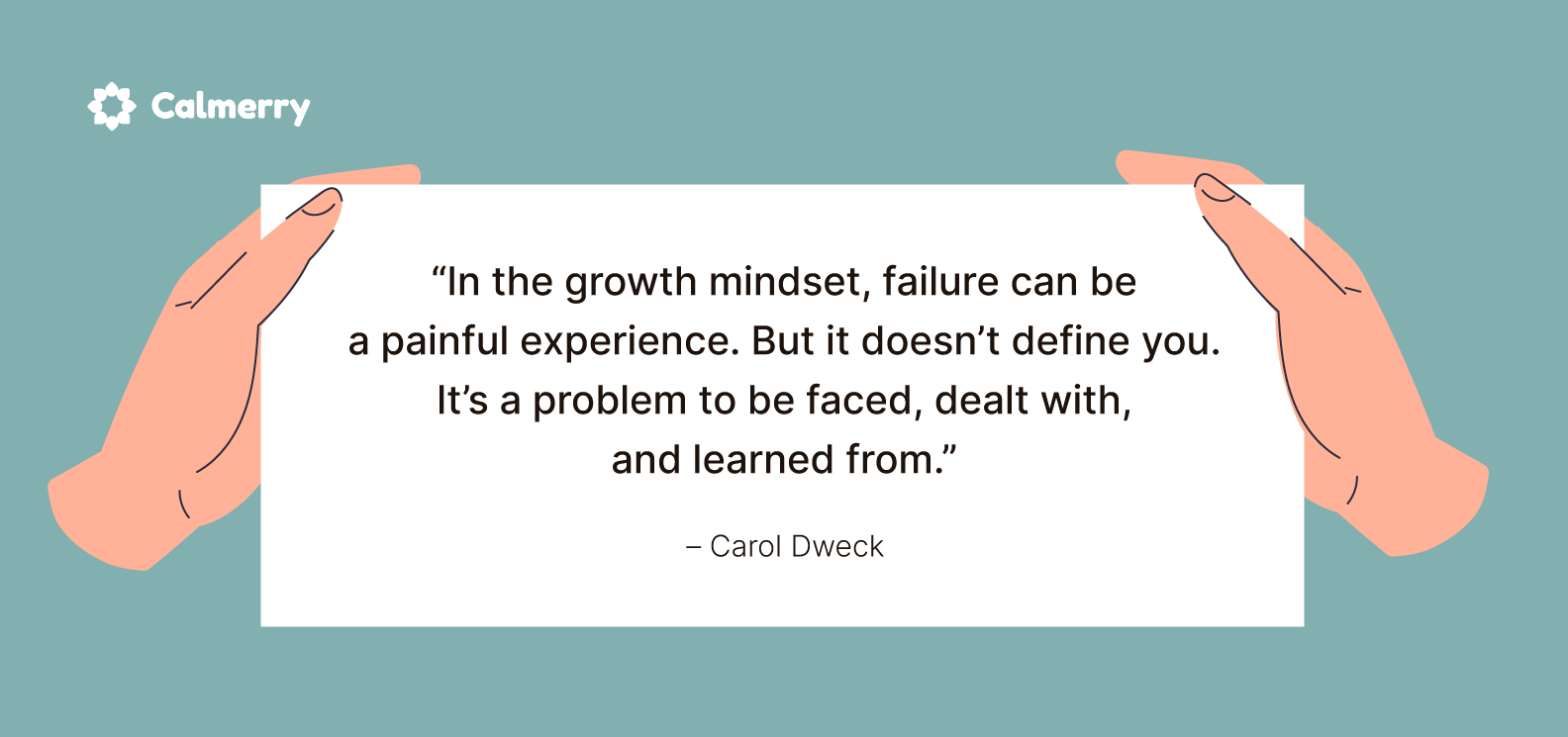
A lot of us internalized the fear of failure and mistakes from a young age. We’re told that it’s something to be ashamed of and that it means we’re not good enough. But the truth is that failure and mistakes are an essential and natural part of life. It’s how we learn and grow.
Every time we fail, we get the opportunity to become better. So, instead of dwelling on your mistakes and beating yourself up over them, try to cultivate a more positive attitude towards them and gain the power of self-forgiveness. Your mistakes are meant to guide you, not define you.
So take on challenging tasks and don’t be afraid to fail. Next time, just take a deep breath and remind yourself that everyone makes mistakes – even the greatest. Ask yourself, “What can I learn from them?” This will help you stretch your abilities and become more resilient in the face of setbacks.
Also, it’s helpful to spot your beliefs that you’re never going to be better than you’re now. How do you feel about that? What causes these thoughts? Perhaps, you’ll need some guidance from a therapist to answer these questions.
9. Be kind to yourself
When you’re constantly striving to be better and do more, as a result, you can be pretty hard on yourself. One important thing to remember about a growth mindset is that it doesn’t mean you have to be perfect, motivated, and inspired all the time and suppress your emotions. This doesn’t mean that you should become a Pollyanna who always sees the glass as half full.
It’s okay to cut yourself some slack when things are tough. In fact, it’s essential.
Rather than beating yourself up when you make a mistake or don’t reach your goal, try to be kind and understanding to yourself. Growth is a process, and there will be times when things are tough.
What matters is how you learn from those mistakes and how you deal with those tough times – and it all starts with being self-compassionate and kind to yourself.
So move at your own pace and give yourself a break when you need it. You deserve it!
10. Unlock your full potential with the help of a therapist
We’ll cite Dr. Dweck: “We like to think of our champions and idols as superheroes who were born different from us. We don’t like to think of them as relatively ordinary people who made themselves extraordinary.“
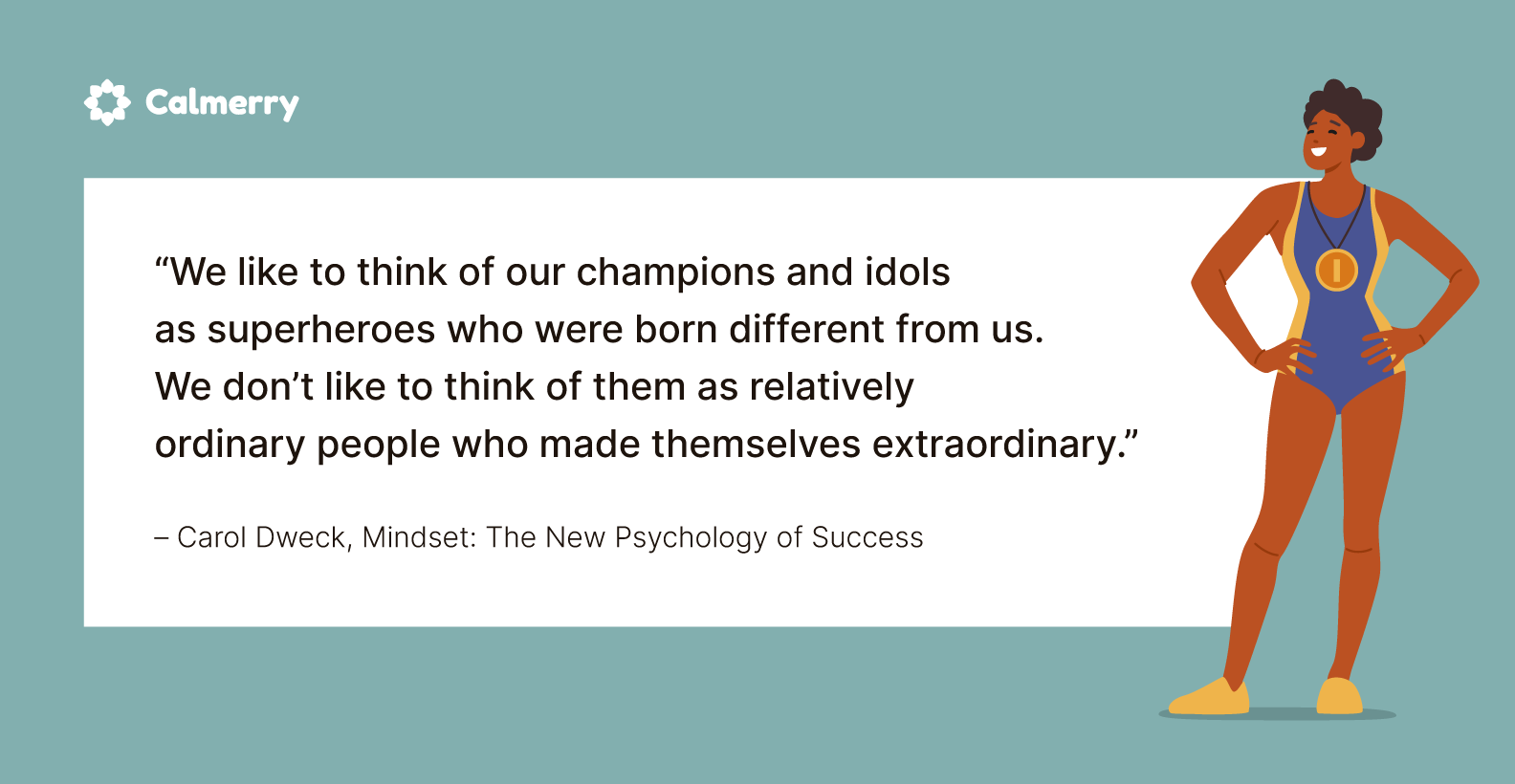
Indeed, it’s much easier for us to accept that some people are just naturally gifted and that we could never be like them. And it’s much harder for us to accept that we all have the potential for greatness – we just have to be willing to work for it.
But which belief relates to you most?
If you find yourself feeling stuck, remember that it’s never too late to take another approach and start living a more fulfilling life.
Therapy on Calmerry is an effective tool for empowering people to overcome challenges and achieve their goals. It can help you understand your thoughts, reactions, and emotions and motivate you to take action to create the life you want to live.
So start growing your mental health skills today, and see how far you can go!
online therapy
live video session



